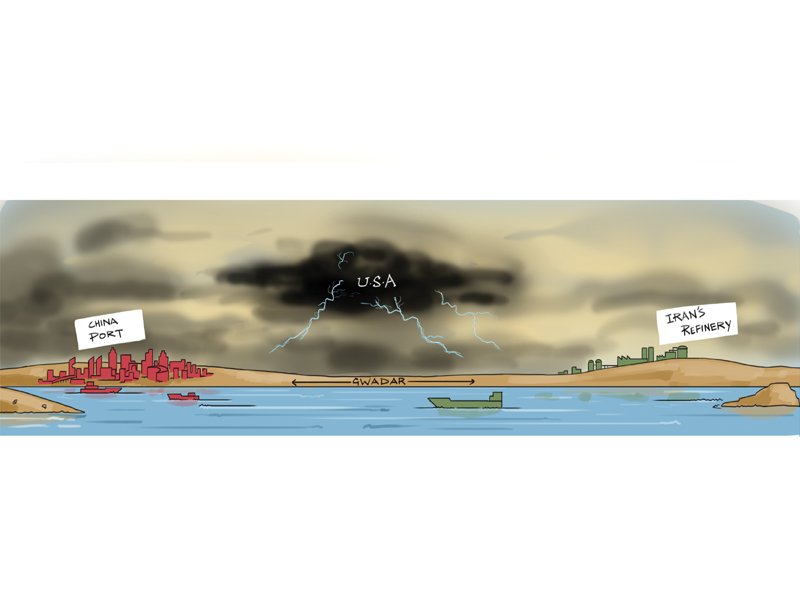
Pakistan and Iran are preparing to sign a memorandum of understanding (MoU) for setting up the country’s largest oil refinery costing $4 billion at the Gwadar Port on March 11, a project that will not only meet Pakistan’s refining needs but will also open avenues for China to get oil supplies.
Iran will set up an oil complex at the Gwadar Port, which will have the oil refinery. According to the original plan, Tehran will also lay an oil pipeline from its territory to Gwadar to transport crude oil for processing.
“If Pakistan and Iran succeed in completing the oil refinery and the pipeline, it may prompt China to revive its projects of establishing an oil refinery in Gwadar and laying an oil pipeline from Gwadar to western China to get oil supplies,” an official told The Express Tribune.

During the tenure of previous government, China had expressed interest in joining the Iran-Pakistan (IP) gas pipeline project, but did not push ahead with the plan following handover of Gwadar Port operations to Singapore Port Authority, the official said.
Now that China has taken over operations at the port, it may reinitiate the projects including oil and gas pipelines.
According to sources, the oil refinery that will be established by Iran may serve as an alternative to Khalifa refinery, which was planned to be built with the assistance of UAE’s state-run International Petroleum Investment Company (IPIC). The Khalifa project got bogged down after controversy erupted over the extension in tenure of managing director of Pak-Arab Refinery Company (Parco), a joint venture between the governments of Pakistan and UAE’s emirate of Abu Dhabi.
Islamabad and Tehran are set to launch the Iran-Pakistan gas pipeline project on March 11 on their border. On the occasion, they will also sign an MoU for setting up the oil refinery.
During a trip to Islamabad on February 20, Iranian Oil Minister Rostam Ghasemi had agreed to build Pakistan’s largest refinery at the Gwadar Port with a refining capacity of 400,000 barrels per day in a joint venture with oil marketing giant Pakistan State Oil (PSO). Prime Minister Raja Pervez Ashraf has given the go-ahead to signing the MoU.
China’s coastal refinery plan is part of its programme to invest $12 billion in multiple projects in Pakistan. The refinery will have the processing capacity of 60,000 barrels of crude oil per day.
Pakistan and China had also considered a feasibility study for the oil pipeline from Gwadar to western China for transporting oil from the Persian Gulf. But the proposal was shelved after Beijing’s refusal to set up the oil refinery, sources said.
Former president Pervez Musharraf had also coined the idea of a trade corridor to meet Beijing’s energy needs and offered help for constructing a strategic pipeline from Gwadar to China’s border for supply of oil from Saudi Arabia.
China is heavily reliant on oil supply from the Gulf states, which currently comes through a very long route, via the Strait of Malacca.
Oil first reaches Shanghai, or the Chinese east coast, and then covers thousands of miles to reach the west of China. However, “the Gwadar refinery can provide a much safer, cheaper and shorter route to the west of China for oil transportation through Karakoram Highway,” a senior official said.
So far, the biggest chunk of Chinese investment in Pakistan has gone to development projects in Balochistan including Saindak copper and gold project in Chagai and lead-zinc mining project in Lasbela.
“The coastal oil refinery project may also create scores of employment opportunities for the local people,” the official remarked.
Published in The Express Tribune, March 6th, 2013.
Like Business on Facebook to stay informed and join in the conversation.
COMMENTS (27)
Comments are moderated and generally will be posted if they are on-topic and not abusive.
For more information, please see our Comments FAQ















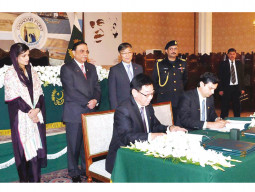
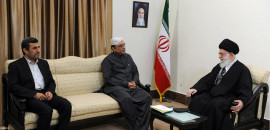
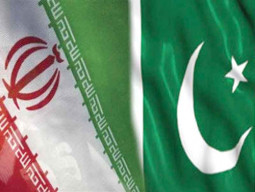
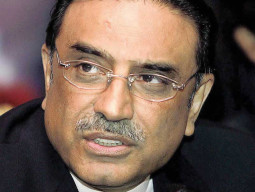


























Let whatever is planned by our enemy we should be bold to face them and do what is good for our country and people. Allah helps those who helps themselvs.
The idea Iran-Pakistan Pipeline was conceived by a young Pakistani civil engineer Malik Aftab Ahmed Khan in mid 1950s, when an article of his was published by the Military College of Engineering, Risalpur.i hope i am right this beautiful dream hope will come true very soon inshaAllah for our great islamic countries this great work takeing stand in very tuagh times for Pakistan & Iran our prays for completion of this great project for the beneficial of millons in our country Pakistan and above may benedictions of great Allah be upon Iran and Pakistan i just felicitate peoples of my country & Iran good days are a head Great work of Imam Ayatollah Khomainy declaeing Islamic republic Of Iran Chaudhary Rahmat Ali Dr Alama Iqbal and all other great Pakistanis Qaid e Azam Mohammad Ali jinnah our father of the nation & our forefathers dream are comming true connection with all the countries Stans a very happy news
@Khan: May Allah bless you. We have Allah's hope that something better than past will come in coming years. I am baluchi but I never said that I am balochi I always says that I am Pakistani because people like you are still alive and as long as they are not only thier mouth limit but must practically prove as u said. Ameen
@Balochi lover:Bro we have no doubt that Balochis are as patriotic as other province people.Balochistan had been neglected and pushed back by the same sardars who were then in power and now against Pakistan.But now there to their badluck now Baloch youth is getting education and not only joining the other walks of life but Armed Forces of Pakistan also.Baloch youth from all tribes, may it be Marri or Bugti etc, have rendered so many sacrifices for their motherland Pakistan that we really can not imagine.we need to spend more and more on education, infrastructure and health facilities in Balochistan to let the Baloch people realise that we all care about them also.Long live Pakistan.
This is all pre-election acts which will be withdrawn afterwards. Our rulers don't have the courage to do something good for Pakistan. It is impossible for them to act something different from what their American bosses ask them to do. Acts like handing over Gwader Port to China (our friend who built it with its own money), Gas Pipeline and now refinary are all for election purpose otherwise they are rulers since 2008. They could have done this much earlier.
@m omar: I have a wish that every pakistani have same thinkings and feeling like yours. But I am really sorry to say that our trust in pakistan and there all past and present government is over. We suffers alot, and thats why we are trying to separate from pakistan to become a independent nation Baluchistan. But still being a born in quetta's soil, I have a little love for pakistan and cannot ignore our shahoda's sacrification in a war of 65 and 71 and thier blood never be wastage by a separative movements. May Allah bless our country and our people and May Allah make successfull these mega projects. Long live pakistan long live China. Ameen.
This news heralds a brighter dawn for Pakistan. Regionalisation is the way forward and by such policies it inshallah will and be a crossroads for trade.
May Allah help Pakistan and Iran to get success in this venture. Long live Muslim brotherhood.
@Balochi lover: This project may help our Baloch people as well. As energy-starved Pakistan will have an alternative (although not enough) gas through Iran, Baloch people can demand for more (legitimate) rights over resources in Balochistan including a share in loyalty of pipeline that may help the economy for the people. It is a win win situation for everyone but this might not please our Arab brothers and America shareef.
None of the above respondents praised the government for this achievment. Great !!
Amazed at the fact, that none of the above repondents praised the goverment for such an achievment.
Gwader port and Pak-Iran gas projects brings more than any expectation but dont forget the balochis rights otherwise we know very well that wht can happen as we already suffers alot.
@M Baloch: The more you keep Saudia and UAE out of our macro-economic designs and implementation, the better for all of us and the immediate region.
@Hussain: Yes, you are one hundred and one percent right. We must resort to hard work intelligently and rely only on Allah Almighty. Allah Ho Akbar.
These news items are the best news coming out in a long time. Pray that the coming governments do not hijack it on American, Saudia and UAE pressure. Salams to Pakistan
Chao USA and now the time has come for you to find another country to keep maintain your monopoly and supremacy because at least on Pakistan your supremacy and monopoly is near to be ended because enough is enough and you have misused your powers of monopoly and supremacy about/for Pakistan excessively and excess of any thing is always bad and harmful.....
good step toward self reliance
it is a good start, keeping in mind the greater interests of the baloch people.
Sine the landing port is gwadar the gas and oil should be used for balochistan's needs. The renaining oil and gas if any can be exported to other countries like China or Punjab.
Pakistan is the greatest country in the history of earth. It will be the richest soon because like of these deals. India is nothing in front of us.
ALLAH has blessed Pakistan with everything it needed to be on top of the World.
These good news are blessing from ALLAH and a big hope for a bright future of Pakistan, when Pakistan is going through hard time.
ALLAH is the greatest and he is the best protector.
However, “the Gwadar refinery can provide a much safer, cheaper and shorter route to the west of China for oil transportation through Karakoram Highway,” a senior official said.
Cheaper and shorter...yes...but safer?
Now that is a good news! Lets hope they finish it as well.
ALLAH HO AKBAR
A good news after long time. If we stop using and abusing Allah and Islam for our political and vested interest, InshAllah Pakistan could progress to a developed country. Obviously, absolute justice and education are other two required prerequisites.
Why Kingdom of Saudi Arabia is missing from the pic?
2013 is the year of change.
love the pic
What a magnificent news ! Allah hu Akber ! Allah hu Akber!!!
God bless Pakistan!!!
Be prepared for more attacks by Zionist lobby (USA/India/Moshad)